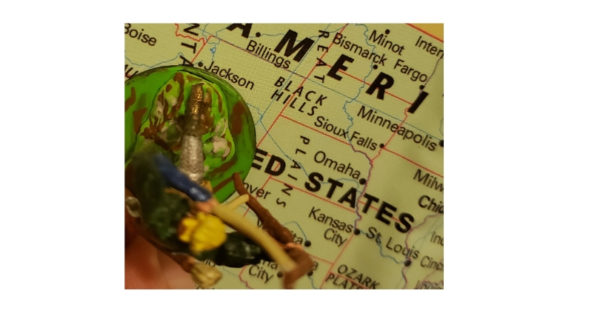When dungeon master’s try to manage traveling in D&D they make many mistakes. Traveling in D&D can involve random encounters, instant travel, or many wondrous sites. How should you manage travel time in D&D?
First, answer “should we skip traveling in D&D?” If the answer is yes, skip it. If the answer is no, state why you can’t skip travel time. Now work around it.
There are many techniques to make traveling in D&D interesting, but you must first answer that basic question. Should you skip traveling, or should you not? When to skip traveling
Is there a point to going over everything that happens in your travel time? If the answer is yes, then state why this is important. If you are having trouble starting why something is important, then most likely it is not.
When something is not important to your game, cut it.
Now that you have cut the appropriate content, what is left? If nothing is left to your traveling time, you can just say that the characters arrive at their destination.
How to handle skipping

When there are no random encounters that are worthwhile and nothing is planned just skip traveling.
Traveling in D&D is easily skipped by telling the players that they arrive at their destination. Here is an example of how this works.
Dungeon master: You want to travel to city A?
Players: Yes.
Dungeon master: Alright, nothing interesting happens on your travels. You arrive. Now what?
This example works. You may be thinking that skipping has to involve more than this, but it really does not.
Skipping is easy, and many players are alright with you skipping. If your party wants more details and wants more to happen during the travel there are a ton of ways to do this.
We will go over random encounters next and how to handle them. After that we will cover descriptions, downtime, portable homes, player interactions, player investment, montaging, NPCs, and minigames.
Combat Random encounters
Some people when traveling in D&D still want random encounters. This is fine, but they should not be meaningless random encounters.
Combat encounters for the sake of combat are meaningless encounters.
If a random combat encounter sets the party up to encounter something greater, then that combat encounter is good to have. Let me give an example.
An owlbear is attacking a woman who is crying in a cage. Now that the party has taken care of the owlbear there is a meaningful event waiting for them.
Random combat encounters can also be used later in the narrative. If the players randomly fight an ogre make that ogre relevant later. The players could stop at a village and hear tales of a rampaging ogre.
This makes the party present a trophy, convince the townsfolk that the party has accomplished the deed, or set up some random plot point that the party insists on following.
Either way, these combat encounters have a point and are not meaningless. Make your random combat encounters meaningful or don’t have them at all.
But what about non-combat encounters? Can you use them when traveling in D&D?
Non-combat random encounters
Non-combat encounters are much better when traveling in D&D. Why do you think this is? Leave a comment below and tell me your answer before I give you mine.
Non-combat encounters lead to interactions. Interactions always have some meaning to players.
Let’s say that the party has come across a farmer who says hello. This random encounter may mean nothing, but why did the farmer say hello?
Players are naturally inquisitive and want to figure things out. If the players interact with the farmer they can learn more about the area and possibly get a sidequest.
If players don’t gain anything out of the interaction that directly benefits them the farmer might have an interesting personality. Players love interesting and odd characters, so they will find meaning in this interaction and not get bored with a few random non-combat encounters.
Non-combat random encounters can also be brought about by the environment. A river is flooding the area, what will your players do to cross it? Mountains are now in the players’ way and they have no idea to get around, what will your players do?
Environmental hazards will become less of an obstacle when the players become higher level, but for a long while, these can create many interesting situations.
Use the environment when traveling in D&D to make the world become more alive.
If the players have to think about how to get around the world, your players will start to think more about the world. Doesn’t every dungeon master want their players to get invested in the world that the dungeon master created?
Descriptions
Traveling in D&D can be boring.
Dungeon master: You travel on the road to the city. You arrive in three days.
That was extremely boring, but what if you livened up traveling?
Dungeon master: On the first day when traveling you see many grasslands on a sunny day. As you travel on the second day the forests seem to grow closer to the road and inhabitants seem scarce. On the third day, a thunderstorm comes midday. The forest is now on both sides of the road almost choking out the path ahead of you. What do you do?
This second example not only made the travel experience more alive, but it forced the players to make a decision and interact with their environment.
Is that environment nice and friendly? No. The scene that was portrayed led the players to believe the forest was dangerous. This makes a random combat encounter have meaning even if there was none because the situation was setup to make this happen.
Descriptors can make traveling in D&D come alive AND give meaning to previously meaningless things.
Always use descriptors unless you are teleporting the party to a new place, and even then tell them the difference in the environment from point A to point B.
If the dungeon master gets into descriptors players will describe their actions, like downtime.
Downtime

Downtime is traditionally where players get to work towards some long term goal with their characters. This activity can happen between levels, sessions, or even campaigns.
In downtime, players can create magical scrolls, work towards new skills, learn new languages, get a new proficiency or whatever crazy thing that players think up.
Why not make characters do downtime activities when they are traveling?
Traveling in D&D takes time. Many nights are spent over campfires, and sometimes players are afforded the luxury of a wagon. If the players have a wagon or coach, give them the benefits of traditional downtime.
This is travel though, so what do you do during non-traditional downtime?
Travel downtime
Traveling in D&D presents many opportunities that would not normally present themselves.
Do players normally sit around camp and become intimate telling stories? Do players normally have to take watches in order to sleep?
All of these downtime activities in traveling are opportunities for your players to interact with one another. Interactions can lead to interesting and memorable events, so ask your players what they are doing.
If a conflict has recently come up, let the party decide who is on watch and ask if the party wants to have any discussions with one another while on watch or during camp. Being forced into a personal one on one position may lead to quite a bit of roleplay.
If players are still hesitant to interact with one another ask them what each person does in the evenings. This way your players can work toward some future goal. If you are tired of players suddenly becoming a wizard or changing class, this is a great way to make narrative sense out of the situation.
Allow your players to do interesting things, but do not infringe upon their downtime activities in meaningless ways.
Watch
We talked about how taking watch in traveling is something that can lead to a unique form of downtime, but we did not talk about the negative effects of taking watch.
Dungeon master: Who is taking watch?
The players then give an order.
Dungeon master: Alright, everyone roll perception.
Everyone rolls and tells the dungeon master, anticipating what will happen next and cursing at a natural three.
Dungeon master: Alright, nothing happens. Onto the next day.
What was the point of that? The answer is simple, there was none!
When watch is being taken make sure that any rolls made are necessary. When players have to roll they expect the outcome to be shaped by their rolls. If the situation was already predetermined it strips away any sense of agency from the players.
If you make rolls pointless, players will think that the game is pointless.
Do not make your players roll needlessly. Instead, skip past the pointless stuff.
Montage

Earlier we talked about skipping travel entirely. While skipping travel is a viable option, you can choose to instead skip certain parts of travel instead of the whole thing.
You do not have to choose if you should or should not involve travel. Instead, pick the most important parts of travel in order to make traveling in D&D interesting.
How you set up a montage is as follows.
- Describe the environment, scenese, and overall travel leading up to the point of action.
- Once you reach the point of action break the narration and make your players make a decision.
That is it.
Many dungeon masters skip the first step.
If players leave a location and instantly arrive at a point of action they have not really traveled. Players are instead teleported to somewhere that is not where they want to be and then have to figure out what is going on.
Always make sure to set up the montage so that your players can follow along the journey. If there is a journey that organically leads to conflict players will be prepared and invested. If players do not know what is happening, they are confused and cannot be invested.
When doing a montage make sure to include BOTH steps, not just the second.
A great way to set up a montage is through NPCS.
Traveling in D&D with NPCs
NPCs add an extra bit of uncertainty to the party traveling with them. The party now has to keep an eye on this new person, even if that person is completely loyal to the party.
NPCs should be used to enhance the experience and possibly comment on simple things. If the party is going through an area that is likely to be ambushed the NPC can become either smug (if they want the party to die) or scared.
NPCs can make the party interact.
No one wants to speak up at camp? Make the NPC speak up and say something. People will rarely stay quiet if another person is speaking and will interact in some way.
Is the NPC competent or incompetent? If the NPC is incompetent make the party have to constantly watch the NPC AND the environment so that the NPC will not die. If the NPC is competent make the NPC compete with the party and start some interactions this way.
NPCs can make the group interact with the environment and the NPC, but how would you go about interacting with the environment?
Minigames
We have already talked about non-combat random encounters when traveling in D&D, but what about food?
Not every game makes players keep track of how they supply themselves or even manage their resources, but traveling can be a great time to do so.
If the party is traveling, they may not be going to a place where they can resupply. How will the party eat for the entirety of their journey?
This is where you can make some minigames happen.
A game could be as simple as this.
-Roll for luck to find prey (Straight roll)
-Roll for stealth
-Roll for attack
This is a little boring, so we can add choices to each minigame!
-Roll for luck.
You are able to see a bird and a rabbit. The bird is in flight, which do you chose to go after?
-Roll for stealth.
The rabbit is eating grass. Do you want to get closer for a better shot or just try to stay out of sight?
This can lower the DC to hit the rabbit or make it harder which presents a choice.
-Roll for attack
You can have the player choose how to attack the creature, but one option that I encourage is to make all of these rolls straight survival. A normal attack is extremely easy for a player and makes the previous step pointless.
In addition to this, when attacking a player just has to hit their target. When hunting a player has to not be noticed and hit. This is a little different from a normal attack roll and highlights a skill that is rarely used.
This is why we should reward backgrounds that are applicable.
Background inclusion
Traveling in D&D can involve many activities. If a player has the outlander background hunting could be significantly easier than it is for a fighter.
If a caravan comes by a person with a merchant background can have a significantly easier time interacting, and can have a background.
If this happens, players will start to look at their character sheets and try to use anything that can be useful.
This is what you want from your players. Make them find anything and everything that they can, and have them use it.
Once your players start getting deeply invested into their characters your game will become more engaging, interesting, and fun.
Once players are more invested, discoveries can be sprung upon players.
Discoveries
Who has played a video game and deviated from the main quest in order to satiate their own curiosity?
You might find a ruin, tomb, quest, something that pulls you away from what you are supposed to do. Once you finish this quest, another is right around the corner. This keeps happening until hours have passed and you have no idea where you were in the main quest, but wait, there is another interesting thing!
Why not include these discoveries into your game? Make the world seem vibrant and alive with constant discovery.
If your game is not heavily focused on a linear narrative let players discover things.
Your players now will start to feel like the world is huge, alive, and an engaging place. Give players a chance to make choices.
If players choose something different from the main plot, dungeon masters can repurpose this later and use it in the adventure.
Conclusion
Traveling in D&D should not be annoying.
Always ask yourself what is the point of anything that you make your players do. If there is no point, just skip past it. If there is a point, make sure to give the players a choice.
Player choice is key in making the world come alive. Without it all the fancy descriptions, random encounters, and amount of downtime mean nothing.
This has been Wizo and keep rolling!




